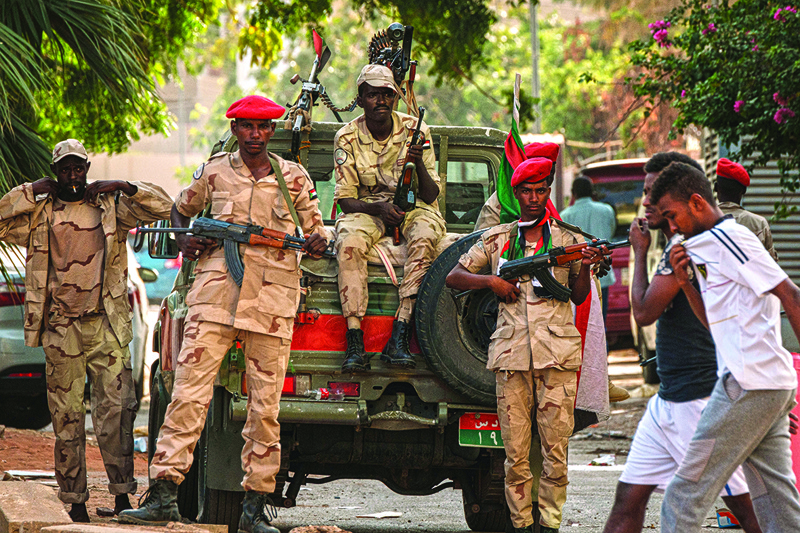 KHARTOUM: In this file photo, Members of Sudan's Rapid Support Forces (RSF) paramilitaries stand on guard outside the offices of the anti-corruption prosecution in the capital Khartoum. - AFP
KHARTOUM: In this file photo, Members of Sudan's Rapid Support Forces (RSF) paramilitaries stand on guard outside the offices of the anti-corruption prosecution in the capital Khartoum. - AFPKHARTOUM: Integrating a powerful paramilitary force into the army has emerged as the latest stumbling block in Sudan's transition to civilian rule following three decades under ousted strongman Omar Al-Bashir. A civilian-military administration has led Sudan since August 2019 under a power-sharing deal that was due to expire next year but was extended after a peace agreement reached in October with several rebel groups. Both deals stipulated the need for reform to the military, including the integration of the Rapid Support Forces (RSF) -- formed in 2013 to crush rebels fighting Bashir's government throughout Sudan-into the regular army.
The RSF largely drew its members from Arab nomads and camel-herding Janjaweed militias whom rights groups accuse of atrocities in Darfur. Tensions between the RSF and the army have reportedly been simmering in recent weeks but appeared to peak after paramilitary commander Mohamed Hamdan Daglo openly rejected a merger with the armed forces.
"Talk of RSF integration into the army could break up the country," warned Daglo, commonly known as Hemeti, in a speech that went viral on social media. "The RSF is established under a law passed by an elected parliament. It's not a battalion... to be integrated into the army," he said.
Military officials have repeatedly denied any rift, but civilian Prime Minister Abdalla Hamdok has pointed to "deeply worrying" fractures among powerful blocs of Sudan's security system. He has called for a unified army that includes the RSF, and warned that unresolved splits among political factions at the helm of Sudan's transition could result in chaos and civil war. "The question now for Sudan is to be or not to be," Hamdok told journalists last week.
'Rumors'
Sudan is navigating a rocky post-Bashir transition marked by a wrenching economic crisis and deepening political division. It has seen a spike in violent crime, protests and popular discontent in recent weeks as the government pushes for tough economic reforms. Daglo and General Abdel Fattah Al-Burhan, the army's commander-in-chief and leader of Sudan's transitional ruling body, have slammed allegations of army-RSF tensions as "rumors" that should be "crushed".
Last month, rebel groups from the Darfur region who signed a landmark 2020 peace deal with Sudan's government called for speeding up reforms to the security sector, including unifying the army. The peace deal could collapse if reforms were not implemented, they warned.
War broke out in Darfur in 2003 when African minority rebels complaining of discrimination took up arms against Bashir's Arab-dominated government in Khartoum. The years-long conflict killed 300,000 people and displaced 2.5 million, according to the UN. Military expert Amin Ismail said the RSF's integration into the army "is a must at this point".
"The RSF was formed for a specific purpose under Bashir, but now that his regime is gone, it should be part of one unified army." A Sudanese military source told AFP that integrating the RSF into the army was "linked to pressures from the West and international institutions". Failing to do so could "affect Sudan's international relations", the source said, requesting anonymity.
'Distant hope'
Jonas Horner, a senior analyst with the International Crisis Group, said reform of the security sector was "a fundamental requirement of Sudan's transition". But he warned that any attempt to forcibly integrate the RSF or disarm it "would potentially catalyze serious urban warfare". Before agreeing to integrate his forces, "Hemeti will likely seek assurances over his role in a post-transition Sudan, and over calls for his prosecution" over the Darfur conflict, Horner said.
Hemeti was involved in the army's April 2019 ousting of Bashir following mass demonstrations against the president's iron-fisted rule. Protesters have accused the RSF of violently dispersing a mass sit-in outside the army headquarters in June that year. Medics linked to the protest movement say at least 128 people died in the days-long crackdown.
Hemeti has denied the allegations. Instead, he has portrayed himself as a "protector" of Sudan's revolution, and was even involved in talks with rebels who signed onto the October peace agreement. Negotiations with a holdout rebel faction were adjourned this month. The group's chief negotiator told AFP that one of the unresolved issues was the integration of armed groups into the army.
Analyst Horner said the RSF's merger with the army "appears to be a distant hope", especially as "Hemeti's power base is wrapped up entirely in his control of the RSF". "As long as Sudan retains multiple armies with competing interests and power bases, security sector reform remains unlikely," he said. - AFP










